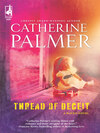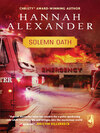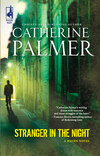Kitabı oku: «Thread Of Deceit», sayfa 4
Accused him.
Like a bullet fired from an assault rifle, the memory of another child’s brown eyes shot into his mind and tore through his heart, wrenching and twisting it. Unable to shield himself from the onslaught, he saw the girl’s thin fingers reaching for him. Smelled the dust on her soft skin as he lifted her in his arms.
He could hear own his breath, heated and heavy. He heard her cries as blood dripped from a bullet wound in her abdomen. The pain he had caused. The terrible, inconceivable, unthinkable thing he had done.
“Oh, God, help me!” The strangled words wrenched from his lips. Sweating, clenching his fists, he swallowed against the knot of pain in his throat. “Forgive me!”
Propelled by the agony in his chest, Sam strode toward the front door. He passed Duke and the dog’s caretaker without a word. Bursting through the metal detector, he stepped out onto the searing pavement.
“Where is she?” he demanded of the youth at the door.
Raydell straightened. “Who?”
“The reporter? Which way did she go?”
“Down the street. Must have parked around the corner. You okay, Sam?”
He started in the direction Raydell had pointed. “Tell T-Rex I’ll be back.”
“What’d she say to you? What’s she gonna do to Haven?”
Unable to explain, Sam broke into a run. As he rounded the corner, her tan Chevy was pulling away from the curb. He leaped in front of it, slammed his palms on the hood, forced her to stop.
Ana braked, threw open her door and jumped out. “Hey, that’s my car you’re beating on, you jerk!”
“The little girl. Flora. She talked to you? Where’s she from?”
“I don’t know. She speaks Spanish.”
“Spanish.” He let out a breath. “Where does she live? What does she need?”
Ana frowned at him. “Why?”
“I have to know.” He struggled to find a plausible reason. “Maybe I can help her.”
She crossed her arms. “What’s going on, Sam?”
He dropped his head, rubbed his eyebrows, fought the tide of emotion that threatened. “It’s nothing,” he managed.
“You chased me around the corner. I nearly ran over you, for pity’s sake. It’s not nothing.”
He nodded. “Okay. All right.” Filling his chest with air, he forced out the words. “Iraq, ’03. The start of the war. I was there. The girl reminded me of someone.” He paused. “Something happened there. In the desert.”
Ana was silent. Her car engine hummed. People passed on the sidewalk. Staring.
Sam tried to make himself move. Return to his normal life. But he knew if he went back into the center, she would be there. Sitting. Looking at him. Gazing with her brown eyes as if she knew.
“Listen, do you want to get something to eat?” Ana asked. “It’s early for supper, but I’m hungry.”
He considered her offer. A kindness, because she saw his obvious struggle. He didn’t much like the woman, didn’t care for what she was doing, the threat she posed to his dream. But for now, she was better than the memory. Better than going back into the center and facing the demon that wouldn’t let him go—no matter how many hours he spent with a counselor, no matter how hard he prayed.
“Yeah,” he said. He rubbed his hand over the stubble of hair he kept short. “There’s a barbecue place down the street. We go there sometimes, Terell and I. We can walk.”
She nodded, stepped back into her car and eased it into its parking space again. Waiting, he pressed his hands on his thighs, drying the perspiration. Ana shut her door and locked it. She walked toward him. Pretty, kind, wary, concerned. Her eyes were brown, too, but older and wiser. Not so frightened. Not so innocent.
“Barbecue,” she said, joining him. “I hope they have onions.”
Ana tugged another napkin from the rectangular dispenser and blotted her chin. This was a mistake. In the first place, she looked like an idiot—dribbling barbecue sauce from the oversize shredded-beef sandwich. Not that she cared how she looked in front of Sam Hawke. But she did want to be as professional as possible at all times. Hard to do when the man kept staring at her with those faded-denim eyes, as though he could see straight into all the places she kept so well hidden. His gaze made her feel off balance, one minute the intrepid reporter and the next a silly schoolgirl oozing barbecue sauce.
She had hoped to talk with him about the incident on the sidewalk, the memory Flora had triggered. Her motive wasn’t all charitable, Ana had to admit. Without taking up too much of her precious remaining time—she had to eat, after all—she hoped she could actually interview Sam. She wanted to find out more about his reasons for founding Haven, his interest in children, the strict military atmosphere he had created there. If she could dig out some information on Terell, even better. And she could always use more details about the lead paint.
But instead of some quiet neighborhood coffee bar where she could question him to the soothing strains of mood music, they had entered a hectic barbecue joint crowded with customers. The shouts of the kitchen workers, the clang of ladles on white ironstone plates, the whoosh of crushed ice falling into empty glasses and the hiss of soda dispensers filled the small room. On top of all that, rhythm-and-blues music blared from a jukebox.
“Pork, chicken or beef?” someone yelled at a customer. The questions from the cooks came rapid-fire, loud and impatient. “Shredded or sliced? Pickles on that? Onions? Potato salad, baked beans or coleslaw? Make up your mind, fella—there’s ten people behind you! You gonna take all day, or what?” There was no way Ana’s recorder would pick up any information she could use. Her hands were so sticky she couldn’t hold her pen.
She had a sneaking suspicion Sam had planned it this way. Despite his obvious distress on the sidewalk earlier, he was too smart not to know she would try to interrogate him. He took a bite of his sliced brisket sandwich, chewed awhile and then licked a dollop of barbecue sauce from the corner of his mouth—the whole time staring at her with those blue eyes. Every time she asked him a question, he tilted his head as though he couldn’t hear—which was probably true. Then he went back to chewing and staring.
As the crowd began to thin, the sound level decreased several decibels. “I’ve got to tell you, Haven feels like a military compound to me,” Ana said. “The dress code, the dog, the guard at the front door. Do you really need so many rules?”
For the first time since they’d met, he smiled at her. “Rules keep people safe. You like that.”
“How would you know what I like?”
“I know.” He tipped up his Coke glass and drained the contents. “You like rules.”
“You don’t know anything about me. We’ve met exactly twice, and I’m the one who interviewed you.”
“Tell me what you know about me, then.”
“You played college basketball, you were in the Marines, you served in Iraq, you founded Haven—”
“That’s not who I am. That’s what I’ve done.” He leaned back. “I brought you here for a reason. Bet you didn’t know that.”
“ I asked you to dinner.”
“I chose the place. Thought I’d see how you like my favorite barbecue joint. You don’t. Too messy.”
“I do like it. The food tastes fine.”
“Yeah, but the napkins. You’ve used seventeen.”
“You counted my napkins?”
“No, but it’s a good guess.” He leaned across the table, his long arms on the red plastic tablecloth. Setting his index fingers on her plate, he gave it a quarter turn. “You don’t like things out of order.”
“How do you know?”
“When I brought your plate to you, I set it with the sandwich at the top. You turned it so the sandwich was at the bottom. When you looked away a minute ago, I turned your plate again. And you moved it back.”
Now she was the one staring. “So I like the main item at the bottom. That doesn’t tell you anything about me.”
“You’ve folded every one of those seventeen used napkins. Used napkins. Folded them.”
“So what?”
“The first time you came to Haven, you learned about our dress code. Today you have on a white shirt of your own. You’re not wearing red or blue, because you know the rules, and you follow them. You follow them, because you like them.”
“That is so lame.”
“You hated the towel pile. You griped about Terell’s office, but you complimented mine. It’s neat. Clean. That’s because I like rules, too.”
“Okay, I do appreciate a certain amount of order in life,” she admitted. “That’s not unusual. And it’s not the most important thing about me.”
“No?” He shrugged. “Then I surrender. What is the most important thing about you, Ana?”
Now he had backed her into a corner. Clever. But Ana had escaped from many corners.
“What’s most important about me can’t be the least bit important to you,” she said. “I’m not the issue here. Haven is. Tell me why you and Terell are so interested in these kids. In two short visits, I’ve observed a child with a bruised cheek, another hiding like a scared rabbit in a corner and a third with cerebral palsy being coerced into playing basketball. That’s enough to set off my alarm bells. What’s going on over there, Sam? What’s with all the rules? And why is Terell forever fawning over the little girls? What are you two men getting out of this?”
“Hold on now. Fawning over little girls?” His brow furrowed. “What are you insinuating, woman? I give you access to Haven, and this is what I get in return? You’ve seen what we do. Terell and I are helping the kids. Don’t you dare write anything else.”
Standing, she shouldered her bag. “And don’t you tell me what I can or can’t write.”
She pushed in her chair, and started for the door. Halfway there, she swung around, stormed back to the table, grabbed the napkin and wadded it into a ball. Then she tossed it at Sam, who caught it neatly in his hand.
She could hear him laughing as he followed her to the door.
Chapter Four
I n three strides, Sam caught up with her. Ana kept walking, heading for her car, forcing him to move fast.
“You’d better explain yourself, Ms. Burns,” he said. “You threw out a lot of loaded accusations back there.”
“Kids with bruises? Defend that.”
“Half our kids come in the door with bruises. They get slapped, punched, burned with cigarettes, and worse. From their bedroom windows, they see drug deals, murders, uncles shooting up, mothers prostituting themselves. Our kids are dirty, hungry and sleep-deprived. I could go on.”
“But guard dogs and metal detectors?”
He stopped walking. “Fine. You want to find fault, go ahead. There’s nothing I can do about it.”
She swung around. “Show me the good, Sam. Open things up for me. Take me to your appointment with Jim Slater. I want to hear why he supports the center. Let me come back tomorrow and talk to your kids. Your volunteers. Give me more of your own time and Terell’s. Show me Haven is a good place, a healthy environment. Prove what you’re doing is valid. Give me reasons why the city shouldn’t shut you down.”
He let out a pent-up breath. “I don’t want you bothering our staff or our kids.”
“Afraid they might say something negative?”
“Absolutely not,” he barked. “They’re busy, that’s all. Besides, they don’t know anything about the lead paint. Jim…he’s on our board, and he’s a big supporter. He won’t want to talk to you about the paint problem, either. I’m visiting him today in the hope that he’ll give us a hefty pledge. If I can show the health department I’m closing in on the funding to fix the problem, they might allow me a few more weeks of grace. I need Jim’s support.”
“He’ll give it to you, Sam. I know the man—and he knows me. He won’t have a problem answering a few questions about his involvement with Haven. He’ll trust me to treat the situation fairly.”
“I don’t know.”
“Look, I have to turn in a good series. My editor is on my back, and I need this interview, Sam. Please.”
He frowned, then shrugged. “Okay, but if Jim doesn’t want to talk about Haven, you have to respect his wishes. I can’t jeopardize my relationship with him.”
“Agreed. We’ll ease into things—talk about his adoption agency, maybe take a look around the place, discuss Haven for a few minutes, and then you can ask for the money. It’s a good agenda, and he’ll be comfortable with it.” She pulled a personal digital assistant from her purse and pressed a few buttons. “Yep, Ladue. Just double-checking the address. Whew—ritzy suburb. Must be a nice house. Jim was a building contractor before his wife died, you know. Colorado, I think.”
“He told me he was in real estate.”
“Could’ve done both.”
“I don’t think so.”
They were heading toward her car, and Sam wondered about her change in attitude. She seemed at ease now, her accusations and suspicions no longer an issue. Had she conned him?
“If Jim got in early at Aspen or Vail,” she said, “he probably made a mint.”
“A real estate agent is different from a building contractor,” Sam insisted. “Those are separate occupations.”
“They both have to do with land and housing. You probably misheard Jim.”
“I don’t mishear people.” He said it so forcefully that Ana flinched as she pressed the button to unlock her car. Still, the woman couldn’t refrain from arguing back.
“What makes you so sure of yourself?” she challenged as she slid into the driver’s seat. “You’re not the reporter. You’re not trained to investigate things.”
“Yes, I am.” He hunched into the seat beside her and immediately lifted the lever to slide it back. Even so, his knees touched the dashboard, and his head grazed the roof. “It was part of my work in the Marines. Reconnaissance. I was trained to watch people, to listen to what they say. I don’t forget.”
As he latched his seat belt, he realized that her baiting had caused him to let down his guard. He didn’t want her to know him too well. Didn’t intend to give away the private, tender places inside himself that should be known only to God. That relationship dominated his life, and Haven was the result.
He had to keep the center going, Sam mused as Ana pulled out of the parking space. Neither lead paint nor a pain-in-the-neck reporter could stop him from giving God his complete obedience. Though he had been forgiven and redeemed, he believed his work at the recreation center was a kind of penance. An earthly labor of love—not only for the children, but also for the One who had given him a reason to live.
“Reconnaissance,” Ana observed, doggedly keeping to her one-track agenda. “A piece of the puzzle that is Sam Hawke. So that’s why you noticed the way I set my plate and how many napkins I used.”
“I see things,” he said. “I’m trained to look carefully.”
“You were a spy in the Marines?”
“Recon. We went in ahead of the main forces. We were there at the start of the conflict. Planning. Tracking. Scoping things out. Securing zones.”
“I’ve always thought of reconnaissance as something to do with terrain and assessing the strength of enemy troops. Why were you trained to analyze people?”
“I’m trained. Let’s leave it at that.” Head turned away, he stared out the side window. Remembering.
“So you went to Iraq in 2003? What was that like?”
“It varied. In the north, with the Kurds, it wasn’t too bad. In the south it was sandy and dry. Hot.”
“You traveled all over the country?”
“I got around.”
“Why didn’t you stay in the service? I hear the retirement plan is great.”
“I needed to make a change. That’s all.” He rubbed his palms on his knees. “We were talking about Jim Slater. He told me he sold real estate in Colorado. Said that’s how he made his money. He didn’t mention he was a widower.”
“I think that’s what changed him.” She was leaving the downtown area now, driving west toward Ladue. “Evidently he had been very focused on his construction business—”
“Real estate,” he cut in.
“You interrupt a lot, you know.”
“You bother me. You’re irritating, and when people bug me, I let them know it.”
She smiled. “Nothing I like better than irritating a smug man.”
Smug. Sam shook his head, wishing he’d driven his own car. “So, Jim Slater lost his wife, and that led him to start an adoption agency in St. Louis. That’s something you don’t hear every day.”
“Neither is a Marines recon man starting an inner-city recreation center. Why did you do it, Sam? What’s the real reason?”
He was silent a moment, trying to give her an answer that would satisfy without revealing too much. “I told you already,” he began. “It was Christ. He became real to me over there. It’s hard to explain. You know, it was like I saw myself—who I really was. And I saw Him. I realized what He wanted.”
“God wanted you to start Haven?”
“No, I mean I realized not only what He wanted from me…but what He wants from everyone.”
She glanced at him. “What does He want?”
“Surrender.”
Ana scrunched up her nose. “That’s not how I see God. I think He wants our love. Surrender makes God sound cruel. Like He’s a despot.”
Sam’s memory of the lines of Iraqi insurgents—trudging across the sand, hands on their heads, giving themselves up—sobered him again. “Surrender takes on new meaning to a soldier.”
As Ana pulled onto the street where Jim Slater lived, she slowed the car. Sam was still gazing through the side window, oblivious to the rows of mansions with groomed lawns and expensive cars in their driveways. Seeing the windswept desert instead.
“Like turning yourself over to another commander?” she asked. “Is that what you mean by surrendering to God?”
“I mean dying. Giving up everything that you thought mattered. Letting it go. And the main thing to give up is yourself. Who you are and what you want. You have to die. Your dreams, your plans, your schedules, your family, your money, all of it. Give it away. It doesn’t matter.”
“How can you say that? Those things do matter.”
“No. Not with real surrender. Jesus kept saying it over and over, like we were too stupid to understand—and we are. He said take up your cross and follow Me, remember? Your cross is where you die, Ana. It’s the end of your life. He said whoever lays down his life for My sake will save it.”
“He also said love Me more than you love your own father and mother, wife and children, brothers and sisters.”
“Love is important, but surrender is the key. Jesus told a rich young ruler to give up everything and follow Him. He told His disciples that if they gave up their families and properties for His sake, they’d get a hundred times as much in return—plus they’d have eternal life.”
She shrugged. “But Jesus couldn’t have meant we’re supposed to quit living, could He?”
“Once you get to that point,” Sam explained, “to crawling-on-the-ground-naked-and-bleeding surrender—you’ll do anything your Master tells you.”
“And He told you to start Haven.”
“Yeah.” He kept his voice low, praying she would understand. “After I gave God everything, He gave most of it back. But it was all different. The same—but completely changed. He gave back my urge to dream and make plans. He gave back my scheduling and training and discipline, all those things I’d been taught. And then He told me what to do with them. They’re for Him now. That’s why I started Haven, and that’s why I’ll defend it with my life.”
Ana stopped the car in the street next to Jim Slater’s gated residence. Sam opened the door and stepped outside, unfolding his tall body into the sunlight. She followed, walking around to join him on the sidewalk.
“You sound sincere,” she acknowledged. “But I’ve heard people talk that way who didn’t really mean it. People can be deceptive. They may claim to honor God, but that’s to cover a web of lies and dark motives. I know it, Sam. I’ve seen it firsthand.”
“You don’t trust me,” he said. “I’m not asking you to.”
“Thank you,” she said in a low voice.
She looked up at him, her brown eyes lit with gold by the late-afternoon sun. Disturbed by this woman far more than he liked, Sam focused on the large black iron gate. He couldn’t care about the pain in her eyes. Couldn’t take her in his arms and rock away the hurt. Couldn’t let the tenderness take over. Ana was pushy and irritating and nosy. Her writing could kill Haven. She couldn’t be any part of his life, Sam realized. He had work to do, challenges to overcome, goals to accomplish.
Forcing himself to turn away, he shook the gate. Locked. He studied the two massive concrete pillars topped with decorative statues of cherubs—angelic-looking babies with wings. “Jim’s expecting me this afternoon, but we hadn’t set an exact time.”
As he spoke, two Doberman pinschers bounded out of a wooded area to one side of the gate and began barking at the visitors. White teeth bared, they snarled and snapped and leaped at the gate, as if eager to lock their jaws on anyone who dared to invade their territory.
“I guess I won’t be climbing over,” Sam said.
“The intercom.” Ana reached for a panel on one of the pillars. She pressed a small black button. “Someone will buzz us in.”
When a voice came over the speaker, Sam gave their names. A piercing whistle drew the Dobermans away, back into the woods, as the gates swung open.
“Mind if we walk?” Sam asked.
“Not at all.”
Jim Slater’s long driveway was lined with wide bands of golden daylilies punctuated by pedestals on which sculpted marble children played and angels danced. Fancy place, he thought. Like a palace. Ana had known exactly what to do with the gate. He glanced at her, wondering about her background. Brownsville, Texas, she had told him. Had her father been wealthy?
“Yes, James Bond, I grew up in a gated community.” She cut into his thoughts. “You don’t have to analyze this one. We lived in a large house with a pool and servants and a fleet of nice cars.”
“And dry cleaning.”
She laughed. “Of course. Old habits die hard.”
“You didn’t want to hang on to that lifestyle?”
“That surrender you talked about…I understand some of it. I know I’m supposed to write. Money doesn’t matter that much.”
“Good thing. I hear journalism is no way to make a mint.” He frowned as they passed a statue of a winged child playing a harp. “These are wrong, you know. Biblical angels are male adults.”
Ana looked up. “What are you talking about?”
“The figurines. Remember Gabriel, Michael and all the angels who sang at Christ’s birth? In Scripture, when people see angels, they’re so frightened they fall on their faces, go blind or lose their ability to speak. Angels bring messages and visions. They carry swords. They rain fire on cities, destroying everyone. They’re powerful, awesome beings who exist to serve God.”
“There you go with your scary, military-style view of religion,” she said. “I think these angels are cute. They’re little cherubs.”
“Cherubim guarded the Ark of the Covenant, Ana. In the Old Testament, that was God’s holiest dwelling place. Cherubs are not fat babies with wings.”
“Oh, there’s Jim!” She lifted a hand to wave at the distinguished-looking home owner waiting at his front door. Sam thought he saw the trace of a frown cross their host’s face, but it disappeared as he and Ana began talking.
“I hope you don’t mind that I came with Sam,” Ana said after the two had exchanged small talk about their church. “I’m writing an article on Haven’s lead paint problem, and it occurred to me that this would be a great opportunity for both of us to talk to you.”
“You want to interview me?” He glanced at Sam. “Ana, I don’t think we should bring Haven’s problems to light in the newspaper.”
“Too late,” Sam said, seeing his hopes of a pledge fading before his eyes. “She’s been hounding us.”
“You know me,” Ana said with a laugh. “Come on, Jim, I only need a quote or two.”
“I don’t see that I could contribute anything. Sam can tell you about the paint issue.”
“Wait a second.” Ana held up a hand to stop the conversation. Her mouth fell open, as she studied the facade of the brick mansion. “Oh, my goodness, I can’t believe this your home, Jim. It’s just now sinking in. This is beautiful.”
“Thank you,” Jim said, his focus following hers. “I’m proud of the place myself. It’s rather large, but I needed space for the children.”
“So, your adoption agency is here, too?”
“I run the business out of my home. I have a network of outstanding foster parents who look after our children until the adoptions are finalized. But our little ones are in and out a lot, of course.”
Ana stepped up onto the stone entryway just outside the front door, and Sam followed with grudging admiration. The woman was incredible. She could con her way into anything she wanted.
“Your marble floor is amazing,” she was saying as she stepped toward the foyer. “When I was a teenager, we moved into a large house in Brownsville—did I tell you about it that Sunday when we worked in the church nursery together? I thought our place was wonderful, but it couldn’t compare to this.”
As Jim Slater moved back to allow Ana inside, Sam’s deeply ingrained reconnaissance training led him to scan the man quickly, memorizing details. Today Jim wore the kind of polo shirt Sam had seen him in often—this one in peach and blue horizontal stripes. Creased gray slacks and leather sandals completed his outfit. Every hair had been carefully combed into place, his jaw clean-shaven, and his eyebrows trimmed.
As he followed the older man into the house, Sam spoke up. “Thanks, Jim. I appreciate your time.”
Jim glanced at him in resignation. “I’d like to welcome you both to the headquarters of Young Blessings Adoption Services.”
“It’s great,” Sam said, genuinely impressed.
“When I moved to St. Louis, this was the best house I could find for the money. It needed a lot of work when I bought it, but remodeling is a hobby of mine.”
“You once owned a construction company, didn’t you?” Ana asked.
“That’s right. In Aspen.”
She shot Sam a look of victory. “Thought so.”
“Did you do your own decorating?” Sam asked, brushing past her to examine a wall lined with oil paintings.
“I brought most of the furnishings from Colorado.”
“Sam thinks your cherubs ought to be holding flaming swords,” Ana confided.
“A little frightening, don’t you think?” Jim led them down a short hallway and into a large, carpeted sitting room. “My wife loved angels, God bless her. She couldn’t get enough. We had glass display cases full of them. I brought the garden statues with me when I moved here. Couldn’t bear to part with everything.”
“Of course not. That must have been difficult for you. Losing your wife and then moving so far away.”
Ana’s voice was soft and sympathetic. Sam felt bad for criticizing the statues. Poor guy must be lonely in this huge house surrounded by reminders of his wife.
“Jim, would you be willing to give us a tour?” Ana was asking. “I’ve considered adopting a child someday. Even though research says kids do better with two parents, I think being a single mom would be all right. I’d love to see your offices.”
“I would, too,” Sam said. “You’ve been a great support to Haven, Jim, and I’d like to learn about your ministry.”
“Well, I…I had planned to chat in the living room.” He rubbed his hands together for a moment. “I actually have a couple of children here at the moment. They’re in the playroom, which is next to my office. You see, Young Blessings provides respite care for our foster parents. Once a week or so, kids can come here for a couple of hours so their caregivers have time to tend to personal business—even see a movie or go out to eat. Looking after these children can be stressful. Most of our adoptees come from orphanages in South America, and they’ve been through a lot. I don’t like to surprise them with unexpected visitors.”
“Oh, but it would mean a lot to me, Jim.” Ana’s brown eyes pleaded. “We don’t have to disturb the children.”
“I suppose that’s right.”
“Great,” Ana said, taking a notebook from her purse. “Before we take the tour, though—how did you get the idea to start an adoption agency?”
As Jim told her about a mission trip to the Caribbean and the orphans he had seen there, Sam studied a marble figurine on a table near the door—a sweet little girl seated on a tree stump, her hands on her knees and a flower stem threaded through her fingers.
“No wings,” he commented, turning to face Jim.
The man shrugged. “Not all of them are angels.”
“Let’s see your offices.” Ana had finished quizzing Jim for the moment, and she was eager to move on. “Where are the two in the playroom from? Somewhere in Latin America?”
“Honduras.” Jim gestured toward a door at the far end of the parlor. As they walked down a hallway, Jim explained to Ana how hard it was to cut through the red tape in the foreign countries where he found children in need of adoption. His story would make a terrific feature article, Ana realized, scribbling notes as she walked. The drama alone was enough to draw readers, and the sympathy factor would be huge.
She sensed Jim Slater was a man of great integrity. It must take an enormous amount of determination and dedication to surmount the legal obstacles to local and international adoptions. The fact that he was willing to take on such a challenge on behalf of needy children bore testimony to the genuine quality of his Christian faith.
Sam was cut from a similar cloth. The type who put his words into action. No doubt he had climbed countless barriers in his effort to navigate the minefield of St. Louis city and county building ordinances. Though he annoyed her at every turn—even now he was lagging behind in the hall, examining pictures and peeking through doors—she couldn’t deny that Haven appeared to be powerful evidence of Sam’s commitment to obey God.
Ücretsiz ön izlemeyi tamamladınız.














